
Topics
Guests
- William Arkinmilitary affairs analyst for the Los Angeles Times. He wrote a piece in this Sunday’s L.A. Times, “The Nuclear Option in Iraq: The US has lowered the bar for using the ultimate weapon,” which looks at the Bush administration’s plans to possibly use nuclear weapons in the upcoming war on Iraq.
Military analyst William Arkin is reporting in the Los Angeles Times:
“One year after President Bush labeled Iraq, Iran and North Korea the 'axis of evil,' the United States is thinking about the unthinkable: It is preparing for the possible use of nuclear weapons against Iraq.
“At the U.S. Strategic Command (STRATCOM) in Omaha and inside planning cells of the Joint Chiefs of Staff, target lists are being scrutinized, options are being pondered and procedures are being tested to give nuclear armaments a role in the new U.S. doctrine of 'preemption.'”
Arkin reports the Bush administration has significantly lowered the nuclear threshold to make so-called preemptive nuclear attacks a possibility. This may also lead to other nations revising their own thresholds that dictate when nuclear weapons are deployed.
Arkin concludes that to use nuclear weapons to defeat Iraqi President Saddam Hussein has the potential to create a political and global disaster.
Transcript
WILLIAM ARKIN: Thank you very much.
AMY GOODMAN: Can you go into first how you know about these plans, and then what you see as the issues with them?
WILLIAM ARKIN: Well, I think there’s two things that are going on that sort of gave me some insights into this. I have been covering the nuclear issue for quite some time and revealed the Nuclear Posture Review last March in the L.A. Times. And so it was a beat that I was very close to. It seems like there is both an enormous amount of activity at the national level to redefine and rewrite the plans for the use of nuclear weapons by the Bush administration post-September 11th, and then I think at the same time there’s concern inside the uniformed military that the efforts to do so and to make nuclear weapons more relevant and to place them in the center of any kind of a war on terrorism is alarming to people in the uniformed military, and they have definitely expressed their concern that these types of moves are going forward. So, I started to hear both inklings of this from inside, from people inside the armed forces, but also had seen that there was a tremendous amount of effort going on to make nuclear weapons more relevant in the overall war on terrorism.
AMY GOODMAN: You lay out your concerns about the U.S. lowering the nuclear threshold. Can you talk about that?
WILLIAM ARKIN: Well, it’s important that most people understand that what’s happening here is a significant departure from even Cold War nuclear policy. I think when we think of nuclear weapons, whether we like them or not, I guess one could conclude that there is a consensus that says that nuclear weapons are only to be used under conditions of national survival or in retaliation to the use of nuclear weapons. And that threat of retaliation is what we call deterrence. And really, for 50 years, that policy, more or less, remained the same and became more and more refined, as nuclear weapons themselves became more and more marginalized with the end of the Cold War.
The departure here is twofold: one, the contemplation of the use of nuclear weapons, not in retaliation to enemy use of nuclear weapons but in anticipation of the use of not just nuclear weapons, but chemical and biological weapons, as well; and, two, the preemptive use of these weapons, which is to say that the Bush administration’s policy, as was codified in a presidential directive last May, is that the United States could reserve the right — well, did reserve the right to use nuclear weapons, and therefore could use nuclear weapons, if it’s thought that a nation or a terrorist organization was preparing to use even chemical or biological weapons, that nuclear weapons could be used in a first strike.
It seems to me that this departure, that is raising the level of the possibility of the use of nuclear weapons, sort of has two effects. I mean, one is, and maybe your listeners aren’t so concerned about this, but it’s a terrible misreading of this military situation and an insult to the U.S. military. I think, if anything, the U.S. military has proven to be one of the most competent elements of the American government, and certainly has proven since 1991 in the Gulf War that the conventional forces available to U.S. disposal make nuclear weapons more and more marginal and less and less important. And this is part of the Rumsfeld-Bush tension with the U.S. military, which I think we’ve seen since the beginning of the administration.
Second, it really signals to the rest of the world a completely contrary and counterproductive policy stance on the part of the United States, which is to say that it says to the Indias, to the Pakistanis and others that the use of nuclear weapons for purely military purposes — that is, to physically destroy a deep underground bunker or destroy a biological weapons facility — is justified, and that nuclear weapons, in fact, are not just weapons that are for national survival and deterrence; they’re actually military instruments to be used on the battlefield. And for the United States even to communicate that possibility and communicate that policy around the world exactly undermines our goals, which is to eradicate weapons of mass destruction, because it elevates the importance of those weapons in the physical military sense.
AMY GOODMAN: William Arkin, you write, “Entrusting major policy reviews to tightly controlled secret organizations inside the Pentagon is a hallmark of Defense Secretary Donald Rumsfeld’s tenure,” and you talk about your concern about bypassing dissenters.
WILLIAM ARKIN: Well, I think that there’s sort of two things that are going on right now. And we saw that, I think, in spades in the president’s State of the Union address. These guys really believe what they believe. They believe that there is a dire threat to the United States and that that threat includes weapons of mass destruction. And the entire development of the Department of Homeland Security, the global war on terrorism, the preparations for war in Iraq, all of these are flowing from a kind of groupthink, or at least what I think is groupthink, that says that not only is there this dire threat, but that somehow it threatens the very survival of America, both of which I think are wrong. It’s not to say that there isn’t a terrorist threat. I just think it needs to be put into proportion.
And so, if you start from the standpoint of understanding kind of the psychology of the Bush administration, then you also understand how it is that they have created a very tight inner circle of decision makers who are sitting on top of intelligence information and are pulling the strings behind a covert war against terrorism that has more and more created ad hoc organizations and ad hoc decision-making structures that circumvent the conventional military and the conventional way of doing things. And not only has this created a tremendous amount of tension with the American military, but it has essentially put in the hands of the president the tools, including, I’m afraid to say, nuclear weapons, that could be employed with little more than the kind of deliberations of a group of people who already are in agreement that the survival of the United States and the West is at hand, in which case then the debate about the use of these weapons would be truncated or would not exist at all.
AMY GOODMAN: And you say this is going on at STRATCOM’s Omaha headquarters, Strategic Command, among small teams in Washington and at Vice President Dick Cheney’s undisclosed location in Pennsylvania?
WILLIAM ARKIN: That’s correct. You know, it’s funny that his undisclosed location in Pennsylvania is in itself an example of these secret organizations. Look, we know where Vice President Cheney goes when he goes to his underground bunker.
AMY GOODMAN: Where does he go?
WILLIAM ARKIN: He goes to a place called Raven Rock, which is also known as Site R. And it’s obvious. It’s well known. And yet it can’t be reported in the L.A. Times.
AMY GOODMAN: This is COG, continuity of government?
WILLIAM ARKIN: Well, that’s part of the continuity of government, but it’s also — Site R is the alternate Pentagon. It’s the place where military operations would be directed from if there were an attack upon the Pentagon, which is, I guess, not so silly to imagine. But this has been a site that’s been around since the Eisenhower years. And it wasn’t initially intended for a government relocation. There were a variety of other underground bunkers that were intended for that purpose during the Cold War. But those bunkers have all been closed, and everything has now been consolidated at Site R, which was initially a military facility.
So, but here we are, where it’s obvious where the vice president goes. It’s the only underground facility that the United States still operates, other than Cheyenne Mountain, where the Air Defense Command is. And yet, it can’t be said. And there are other organizations and capabilities of the U.S. government that are in a similar boat — that is to say, they’ve either been newly created since 9/11, or they have been reinvigorated. And this whole sort of secret world that is now being created to ostensibly fight the global war on terrorism is really a severe challenge to what we consider to be the military and foreign policy options available to the government, because those options and capabilities are the ones that most people see and are open to them, and are the ones that they conceive of when they think of war.
AMY GOODMAN: William Arkin, I want to thank you for being with us, military analyst —
WILLIAM ARKIN: Thank you very much.
AMY GOODMAN: — whose piece appeared last week in the Los Angeles Times. Arkin ends by saying, “The danger is that nuclear weapons — locked away in a Pandora’s box for more than half a century — are being taken out of that lockbox and put on the shelf with everything else. While Pentagon leaders insist that does not mean they take nuclear weapons lightly, critics fear that removing the firewall and adding nuclear weapons to the normal option ladder makes their use more likely — especially under a policy of preemption that says Washington alone will decide when to strike. To make such a doctrine encompass nuclear weapons is to embrace a view that, sooner or later, will spread beyond the moral capitals of Washington and London to New Delhi and Islamabad, to Pyongyang and Baghdad, Beijing, Tel Aviv and to every nuclear nation of the future. If that happens, the world will have become infinitely more dangerous than it was two years ago, when George W. Bush took the presidential oath of office.” You’re listening to Democracy Now! When we come back, we’ll look at depleted uranium. Stay with us.

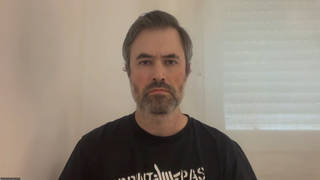
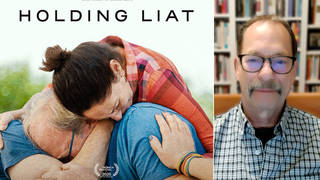
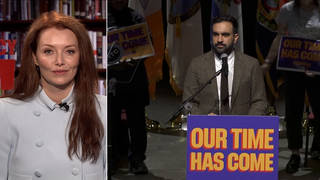
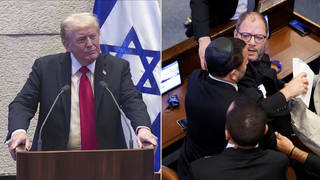






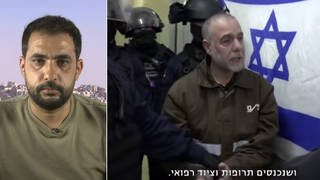
Media Options